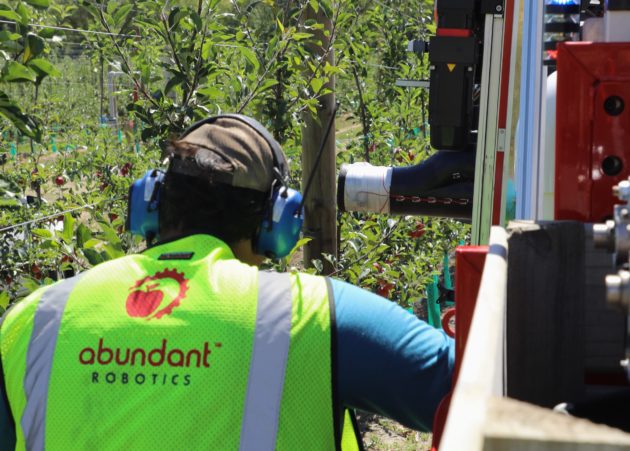
Next fall, as you browse the produce section at your local grocery store, pay close attention to the apples. You might be witnessing American history.
For the first time, some of the apples sold in the U.S. will be picked by a robot rather than human hands. That’s thanks to agricultural automation startup Abundant Robotics, the maker of apple harvesting machines that will partake in Washington state’s next harvest.
“This will be the first season that we’re actually ready to harvest commercially,” said Abundant CEO Dan Steere. “It’s incredibly exciting.”
Abundant’s picker has more in common with a really smart Hoover vacuum than a human hand. The robot moves down rows of orchards and uses artificial intelligence with a dash of LIDAR to search for ripe apples. Once spotted, a robotic arm with a vacuum gently sucks the apples from the tree into a bin.
The achievement is owed to advances not only in machine learning and robotics but also in agriculture. The architecture of apple trees has evolved over the decades, and it’s now common to grow them on trellises like you would tomatoes or cucumbers. Modern apple trees are also smaller, derived from dwarf varietals that yield more per acre and produce fruit more quickly after being planted.
These horticultural leaps have allowed farmers to double their apple yields. They’ve also made the job of picking easier for humans and, now, for robots.
Karen Lewis, a tree fruit specialist at Washington State University who has worked with Abundant and other robotics startups, said that apple trees have reached a “sweet spot” for robotic harvesting. Orchards are now sufficiently uniform and predictable for machines to reliably pick fruit, and canopies are narrow enough for sunlight, the human eye and vision systems to penetrate.
Tech companies that are successful in agriculture, she said, are the ones that listen to what farmers need. “We’re not going to let technology be the driver here. Horticulture needs to be the driver.”
The U.S. debut comes following a rollout in New Zealand, where Abundant began a commercial harvest earlier this year. Steere said the decision to make the global debut in New Zealand rather than Washington was based purely on seasonal luck. He added that Abundant owed a lot to the Washington growers, who gave the startup crucial support and feedback in its early years.
“The special thing about Washington is the scale, the sophistication and the openness to supporting innovation,” he said. Steere declined to say how many machines would be put to use this fall or which growers Abundant is working with.
Menlo Park, Calif.-based Abundant has raised $12 million with backing from GV, formerly Google Ventures, among others. The startup formed out of the robotics division at SRI International, a research lab in California.
Abundant’s main competition is Fresh Fruit Robotics, an Israeli startup that’s developing a picker that uses a claw-like appendage. Both companies have received funding from the Washington State Tree Fruit Research Commission.
Steere and his team have been developing the robots with help from growers in Washington state for the past six years. The process has involved both give and take: Abundant received feedback on how to improve the machines, and growers have adapted their practices to work with automation.
“It’s not that people haven’t wanted to automate harvesting fruit, it’s that it’s never been possible,” Steere said. “Now we’re making it possible.”

Wherever automation appears, so does the question of whose jobs might be displaced. But American farmers have for years complained of a labor shortage and are increasingly dependent on foreign seasonal labor.
Approvals for H-2A visas, which allow foreigners to do agriculture-related work in the U.S. temporarily, increased by a factor of five over the past 13 years, according to the USDA. The program now accounts for around 8 percent of the total agricultural workforce. In Washington state, those seasonal worker visas exploded from 3,014 to 24,862 in the past eight years.
“We’re being squeezed,” said Lewis. “There’s substantial pressure from not being able to attract and retain a workforce.”
That labor shortage has been accompanied by higher wages. In Washington state, the minimum wage is set to jump by $1.50 to $13.50 an hour next year, an increase that Lewis said could amount to a quarter of a million dollars for a grower that manages 250 acres. The typical American farm worker makes $11.84 per hour.

Farmers have also been battered by trade wars, which have caused exports to slump, and they face threats from shifting weather patterns tied to climate change.
Robots could help carry some of the weight of Washington state’s enormous apple harvest, which grows nearly two-thirds of all apples in the U.S., according to the U.S. Apple Association. The U.S. ranks second globally in apple production, behind China.
Agricultural robot shipments are expected to grow from 60,000 units today to more than 727,000 in 2025, according to market research firm Tractica.
Still, replacing people with new technology is “scary and expensive,” Lewis said.
Lewis is hopeful that the robots are finally reaching a point where they can make growers more profitable. “We’ve had a bit of over promise, under deliver” from tech companies, she said. “That has led to fatigue among growers.”
Abundant’s leadership boasts some agricultural street cred. Steere grew up in a family of farmers, spending time on his grandfather and uncle’s cotton and soybean farms. Abundant co-founder Michael Eriksen was raised on a dairy farm in Denmark. And Curt Salisbury, another co-founder, is a native of the Columbia Basin, one of Washington state’s main apple-growing regions.
“When I was a kid, I was fascinated with combines, the big machines that would go through and harvest soybeans, or cotton pickers that would drive through and pick cotton,” Steere said. “We get to make these machines for an industry that’s never had that kind of automation before.”



